The Desi Buzz US Bureau Chief Dr Shabana Parvez, MD FACEP (ArlingtonIntegrative.com) spoke with Zarina Baber , First Indian American IT Asst Commissioner of Minnesota, Chief Transformation Officer, Chief Information Officer for Minnesota Governor Walz, politician, activist, and community leader. She was the first South Asian and Muslim woman to do so in Minnesota to contest for the Lt. Governor for State of Minnesota position.
About Early Life and Pioneering Achievements
Dr Shabana Parvez: Zarina, you grew up in a family that moved frequently due to your father’s government work. How did your early life in different parts of India influence your perspective on diversity and adaptability?
Zarina Baber: India is incredibly diverse, with distinct differences in lifestyle from state to state. Growing up in different regions of India exposed me to a variety of cultures, languages, cuisines, and traditions. While the concept of diversity as we know it today is not something I grew up with, I really did not distinguish myself from the rest of the surrounding. The community concept was more important than our individual identity. Regardless of the differences in religious practices and cuisine, I felt the culture was the common denominator such as respect for elders, teachers, and siblings. We celebrated everyone. It did teach me to respect those around me and to view the world with empathy. These were the principles I grew up with and saw my parents practice them including respecting those who were needy and poor.
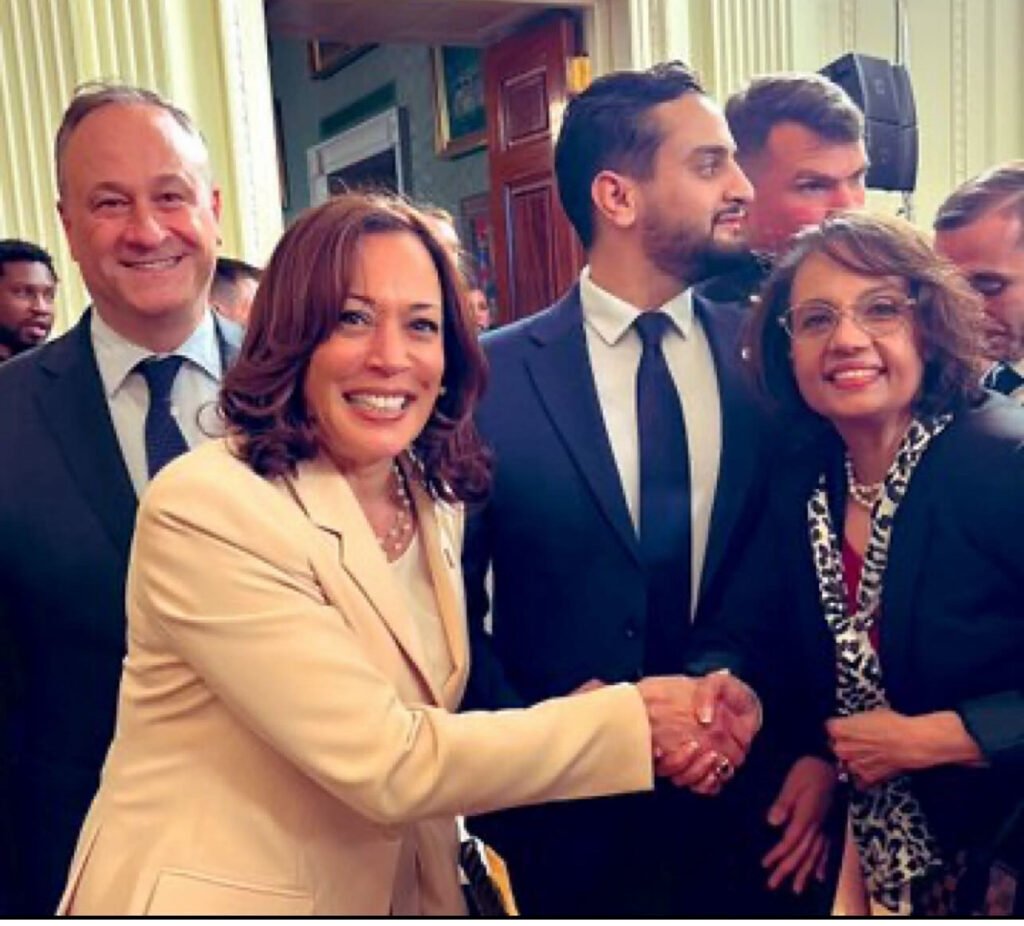
Adapting to the environment came natural to us. For example when we moved from Rajahmundry to Delhi, we had to learn the Hindi alphabet while in 6th grade and the subsequent year when we moved to Hissar, Haryana my brother and I had to adjust to Hindi as the medium of instruction in every subject (except English of course). So we went from learning the alphabet one year to reading and writing every subject in the new language the following year.

As a result I think I developed a natural sense of curiosity, resiliency and appreciation of differences and learning to be flexible in my approach to life.
Dr Shabana Parvez: You were one of the pioneers in forming the First Women’s Cricket Team in Andhra Pradesh. What challenges did you face in breaking the glass ceiling in a male-dominated sport, and how did this experience shape your future path?
Zarina Baber: Having been influenced by my two elder brothers, I was always striving to be more like them. I always questioned why certain things were more easily accessible to them versus me. That was one part of the culture I always resisted. This questioning and curiosity allowed me to get creative and look for solutions to challenges. Women’s cricket in some states was already starting to gain popularity and there was no reason why Hyderabad should fall behind. One of the key personalities that helped get this off the ground for us was a mother of a friend – Mrs. Nalini Dausi. She had connections at YWCA, Hyderabad’s cricket association and few other personalities. She worked really hard to line up support from various colleges and enlisted one of the best cricket coaches for us. Mr. Mirza Rahmatullah Baig – Baig Sahab, who coached some of the India’s most illustrious players like Kapil Dev, Md. Azharuddin and VVS Laxman and many others. 2005 is 50th anniversary of us having started the game. Honestly, if it were not for these two personalities, and the passion of this initial group of young ladies who dared to break the tradition and aspire to break the glass ceiling, I doubt if Hyderabad Women’s cricket is where it is today – this was the ground-breaking footing that was needed to produce the likes of the star powers like India’s captain Mitali Raj.
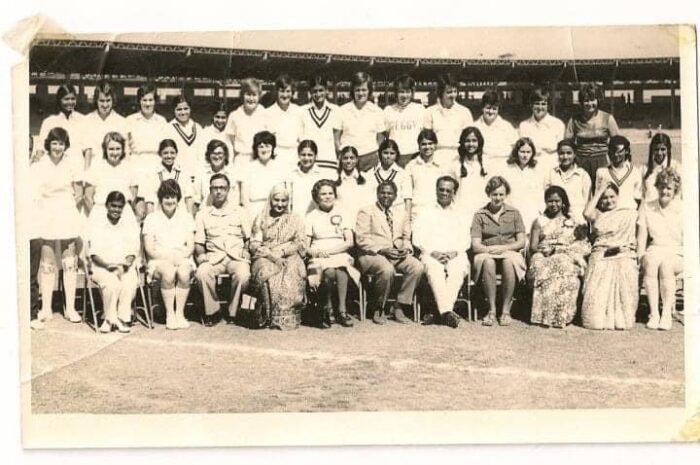
It takes a village at times and background support to achieve this monumental transformation. It showed me the value of being daring, hard work, building a support system and the lesson that if we dare to dream and work towards it, opportunities open. My family’s support was extremely critical and my brothers and my parents provided that.
Journey to the US and Education
Dr Shabana Parvez After getting married at 18 and moving to the US, you had to restart your education, eventually earning multiple degrees while raising a family. What motivated you to continue your education despite the challenges, and how did it influence your career?
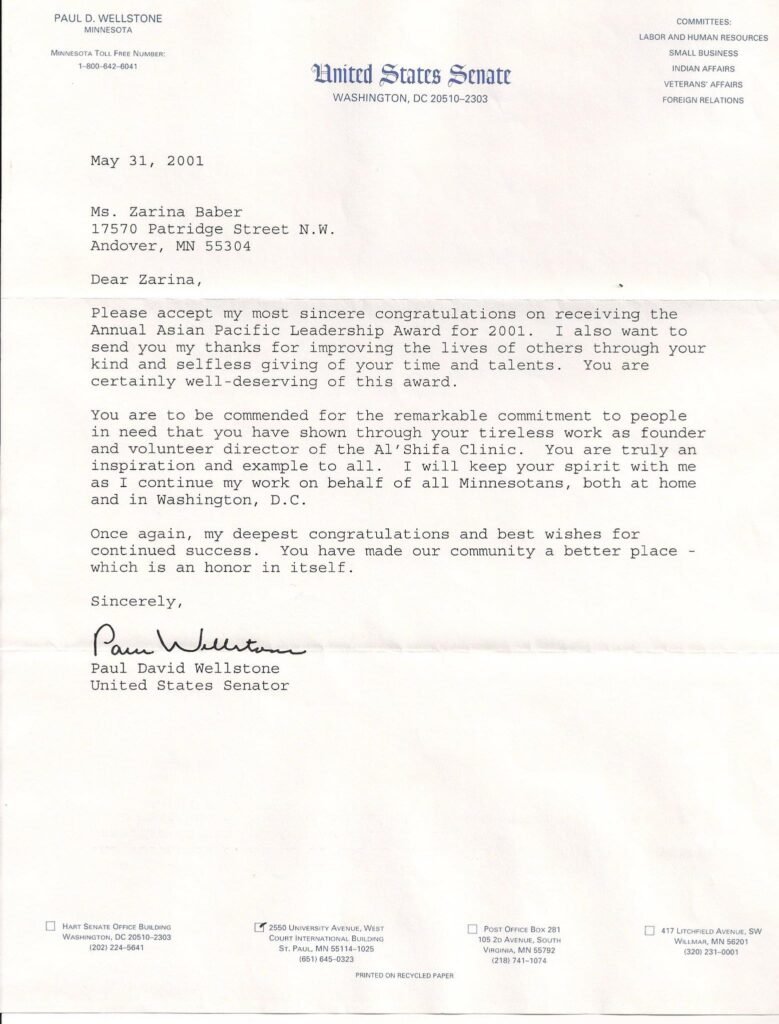
Zarina Baber: I was always pretty intent on completing my education. It was a dream I wasn’t willing to let go. Fortunately, I found in my spouse a similar emphasis and passion for education. However, due to his job responsibilities, we moved around quite a bit in the mid-west often finding ourselves in small towns. When I was rejected by Iowa State University (ISU) due lack of sufficient credits from my undergrad at Hyderabad which they claimed was not equivalent to US high school, it was my husband who recommend that I take my GED path. I spent nearly 2 years at ISU and when we moved to Minnesota, I completed my degree at University of Minnesota, Carlson school of management. My husband’s discussions on technology at his work, my exposure to business and management in school, and my focus on people influenced the choice of my career.
Dr Shabana Parvez: Many immigrants face hurdles in getting their qualifications recognized. What advice do you have for South Asian immigrants in the US trying to navigate the education system?
Zarina Baber: Yes, that was my experience. It’s having a conversation with the college or universities to identify why and then figuring out the course of action. We have multiple resources available in this country – its researching options and ensuring the correct path for yourself. If you have the focus, you will seek out creative ways of overcoming the barriers. My sincere advice is to find mentors.

In a new country with language and cultural differences, learning a new educational system is very challenging. Find a mentor who can help you in the process. Someone who has been through similar challenges. College counselors may offer some good advice but may not understand all the nuances and challenges you may be facing coming from a different country and a different educational system. And in my case, I had family obligations that needed to be taken into account and if your situation is similar find someone who can help you through the complexities of balancing family life with student life.
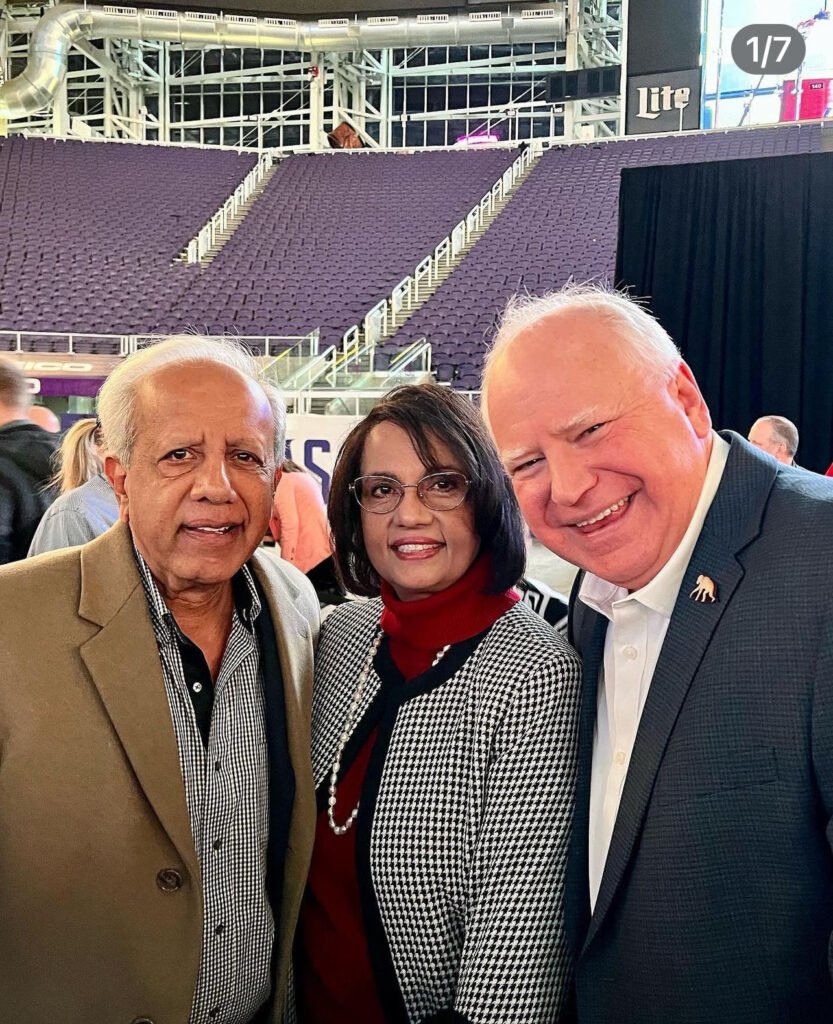
Navigating the U.S. education system as a South Asian immigrant requires patience, research, and strategic planning. While the path may be challenging, it’s important to remember that many people have faced similar obstacles and found success.
By staying informed, seeking out resources, and being willing to invest in your professional development, you can build a fulfilling career in the U.S. U.S, offers many opportunities, sometimes you may need to pivot from a traditional path to get to where you want to go.
Career and Leadership in Public Service
Dr Shabana Parvez: You’ve had a remarkable career in Information Technology, including your current roles with the Office of Minnesota Governor Walz. Can you share how your professional background helped you lead transformative initiatives in public service?
Zarina Baber :When you think of technology, you think about change. It is the world we live in. Change creates excitement for some and fear for others. I think my ability to think strategically and delivery tactically along with my passion to build relationships and practice servant-leader leadership have all contributed to my success in leading transformative initiatives not just for the State of Minnesota but also in my career in the private sector. Leading with empathy and surrounding myself with staff who know more than me has been my underlying principle to success.
Dr Shabana Parvez: As a South Asian woman who has held leadership roles in government and technology, what unique perspectives do you believe you bring to the table, and how can others follow in your footsteps?
Zarina Baber :For me, its all about people which necessitate building that network of support – you see that in all my previous experiences, from cricket start-up, to my path to education or my political work to my career. It’s the same concept. Change is not easy for people, whether in personal life or in a professional setting there is always an element of fear that we need to understand and need to incorporate in our approach.
I also believe in being flexible – not every approach will fit the audience, and this is where listening becomes extremely critical – it’s just not in the public sector but this is the approach I also applied in the private sector. I truly believe that in order to be a good leader you also have to be a good follower. It’s the team that pulls you though so acknowledging the contributions of others while providing your vision and direction is the secret sauce.
I never believed in playing a victim. When I encountered barriers, I focused on how best to overcome them, stretched my imagination, talked to a lot of people, engaged with mentors and getting different perspectives.
Ultimately, you are responsible for your own decisions and outcomes. If you have that mindset, you do overcome the challenges as you encounter them – you don’t get frozen into being ‘rescued’.
Community Service and Advocacy
Dr Shabana Parvez: Your founding of the Al-Shifa Clinic has impacted thousands of underserved populations. Can you share what inspired you to start this clinic and how your upbringing in India influenced this decision?
Zarina Baber: My upbringing in India was the most influential focus for this work. My father served in WWII as a doctor and after the war went into government service. I witnessed firsthand his compassion for the needy and the poor. He often at his own expense would take care of their health needs knowing full well that they wouldn’t be able to pay for his services and medications he provided to them. He has always been my hero including being a fan of his athletic abilities. He was my motivation for Shifa clinic.
Once the concept was discussed, I brought all the right talent and expertise together that helped create this model. We partnered with various healthcare entities who would help supplement services on behalf of the clinic. While I am credited for founding the clinic, I do have to acknowledge the immense compassion of the physicians in our community who volunteer their services and time for the clinic. I am happy to say, 2 other clinics have emerged in Minnesota. We partner with these other clinics to cover the a broader geographic area and alternate days of service.
Dr Shabana Parvez: You’ve also been heavily involved in human rights advocacy. How have your efforts in supporting Bosnian and Somali refugees shaped your understanding of global issues and the South Asian diaspora’s role in international humanitarian efforts?
Zarina Baber: This was one of the most difficult of all the work I have done in my volunteer capacity. It was heart-breaking to become aware of the all the affects war and genocide has on the families. When rape and starvation is used as a weapon of war, you can imagine the generational trauma these families will endure. Advocating on behalf of the victims is one of the most challenging of tasks anyone can take on especially when the audience is not receptive to the stories of pain and suffering either due to political reasons or beauracracy or will.
My efforts in supporting Bosnian and Somali refugees deeply shaped my understanding of global issues by highlighting the interconnectedness of humanitarian crises and the universal commitment that is needed for compassion and solidarity for peace. Building allies for advocacy was foundational to our work.
We worked with human rights organizations like Advocates for Human Rights, Lutheran Social Services, American Refugee Committee and other inter-faith organizations. Engaging with these communities and later with other similar tragedies like Rohingya or Uyghurs helped me understand the impact of displacement, loss, but also be awed with the resilience of the human spirit of these victims.
It also high-lighted for me the goodness of those individuals who consistently show-up to help strangers. They often open up their homes and wallets or help in any other capacity to support refugees. That is what I am most proud of our community here in MN. Families hosted families in their homes for several months until proper housing was identified for the refugees. While others donated cars, funds, groceries, furniture to resettle them. Beyond the politicians and the bureaucracy this stabilizing force of community members try desperately to minimize or undo the aftermath of war.
This diasporas bridges the gap between host nations and displaced populations, advocating for refugees’ rights and long-term integration. We also leveraged our long-term relationship we had build with local politicians who helped these communities navigate the complexities of integration.
Political Candidacy and Representation
Dr Shabana Parvez: You made history by running for Lieutenant Governor in 2018, the first South Asian woman and Muslim woman to do so in Minnesota. What did this experience teach you about representation in American politics?
Zarina Baber: Actually, I was the first Muslim woman to run for a statewide office in the US. I was asked by a gubernatorial candidate Rebecca Otto (State Auditor) to be her running mate as the Lieutenant Governor. The experience was transformative that taught me a great deal about the power and challenges of representation in American politics.
My interest in politics started after the Oklahoma City bombing in 1995. When it happened, the media and the pundits immediately jumped to the conclusion that it must have been a Muslim terrorist. This narrative resulted in my son becoming a victim of bullying in his school. It actually turned out to be a domestic terrorism act and had nothing to do with Muslims.
It was then that I realized that being on the sidelines wasn’t a good option, that we needed to become part of the system and take control of our own narrative and not let others define us or give us an identity. It affirmed for me how critical representation is and are afforded this opportunity in this country to be part of a solution. I take my motivation from Shirley Chisholm, the first black woman to be elected to the United States congress, and who in 1972 ran for Democratic Party’s presidential nomination.
If VP Kamala Harris wins, she would be standing on the shoulders of those who came before her like Shirley Chisholm. I am totally inspired by her quote, “If they don’t give you a seat at the table, bring in a folding chair.”
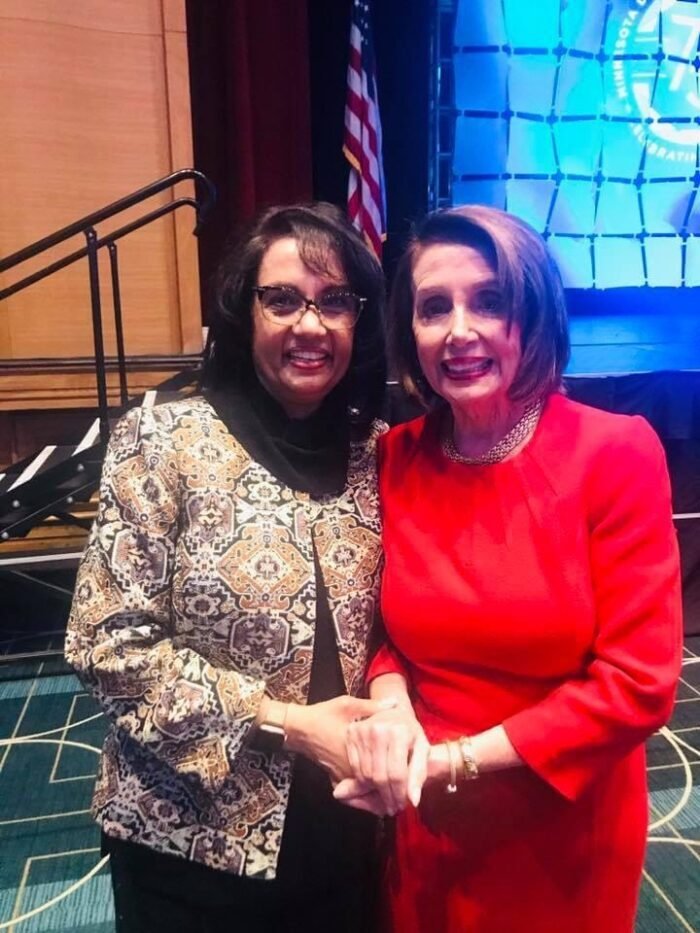
Being the first to run with no experience is all about challenging the status quo. By simply running, I was able to disrupt traditional narratives about who can or should be in positions of power.
For many people in Minnesota—especially women, immigrants, and communities of color—my candidacy was a symbol of possibility and a reminder that politics could reflect their lived experiences.
This was particularly important for Muslim Americans and South Asians, who are often marginalized or don’t have sufficient representation in the political landscape to have a person who looks like them, who talks like them and understands their issues and concerns to be in key positions working on their behalf.
However, I also learned that being a “first” comes with unique challenges including the weight of expectations, both from within my own communities and from broader society. There was pressure to be everything to everyone—pushing against stereotypes, advocating for progressive policies, and breaking new ground, all while learning the process and staying true to my own values and vision.
Lastly, my candidacy reinforced the importance of resiliency in the face of barriers. As a South Asian, Muslim woman, I encountered skepticism and hostility, surprisingly from some elements of my own community which was a difficult lesson for me to learn.
I underscored the importance of self-reliance and self-confidence that is needed to break glass ceiling in this space. However, I was also pleasantly surprised at the support of unexpected allies and friends and distant family that overshadowed the skeptics.
I feel now more than ever, there is a need for more diverse voices in American politics—to ensure that policies are more inclusive, equitable, and reflective of the people they are meant to serve.
Dr Shabana Parvez: With your involvement in the National Muslim Caucus of America and advocacy at the Democratic National Committee, what do you believe is the role of South Asians and Muslims in shaping the future of American politics.
Zarina Baber: I believe South Asians and Muslims have a vital role to play in shaping the future of American politics, not only because of the growing size and influence of these communities but also due to the unique perspectives they bring.
One of the most critical roles is in diversifying leadership at all levels of government. South Asians and Muslims are underrepresented in elected offices, but when they do step into these roles, they bring diverse experiences related to immigration, religious freedom, and civil rights.
Their presence challenges stereotypes, shifts narratives, and opens doors for difficult conversations. As more South Asians and Muslims run for office, they can help shape policies that reflect the multicultural and multifaith realities of the U.S. The biggest lesson learned for me was the importance of building relationships, and long-term engagement of our community in politics. We are relatively still a young immigrant community and this engagement is still pretty sporadic.
We have experienced the impact of discriminatory policies, whether through post-9/11 Islamophobia, the Muslim travel ban, or challenges faced by immigrants in general. Now more than ever, our nation stands divided in the current system.
Often underrepresented communities needs fall through the cracks of constant divisiveness of our two party system. By being in a position to share our lived experiences and lobbying for change the South Asians and Muslims have the opportunity to reshape American politics by promoting inclusivity, advocating for justice, and ensuring that the voices of those who have traditionally been marginalized are heard and valued. Their engagement will be key to building a future political landscape that is more reflective of America’s true diversity.
Balancing Family and Career
Dr Shabana Parvez: You’ve balanced a successful career, volunteerism, and family life, including raising two highly accomplished sons. What strategies have helped you maintain this balance, and what advice would you give to young South Asians juggling family and career aspirations?
Zarina Baber: Balancing a successful career, volunteerism, and family life has been a rewarding journey; however, I did not place equal weight on all 3 elements of my life. For me, my family and their needs took top priority and everything else needed to fit around that priority. I couldn’t have achieved the outcomes if it hadn’t been for the support of my family. It’s about sacrifice, compromise and flexibility.
My husband played a critical role of a mentor and coach in my decision making. My kids were excited that I was in school like them. I graduated from my undergrad the same year my eldest son graduated from his elementary school and years later we both graduated from our Masters the same year. So, I think of all my achievements not as my sole effort but as part of our family’s journey and ongoing story.
In terms of advice to others, I would recommend progress over perfection. There will be times when one aspect of life requires more than another, and that’s okay. I’ve learned to set realistic expectations for myself and embrace the ebb and flow of life. In the end, this approach is very rewarding. And finally, give time for self-reflection and personal care of self both physically and mentally. Celebrate small success and don’t be afraid to ask for help.
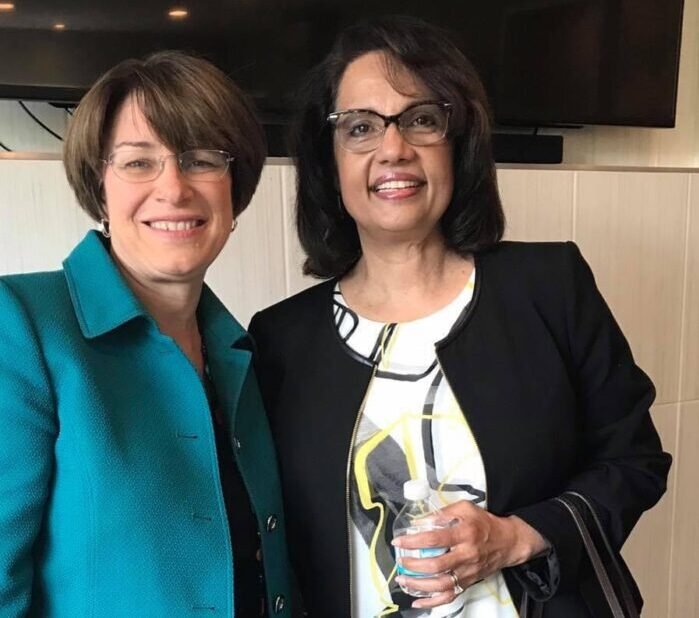
Legacy and Future Goals
Dr Shabana Parvez: Looking back at your journey, from being recognized as a “Disruptor” by AARP Minnesota to your ongoing work, what legacy do you hope to leave behind for the South Asian diaspora?
Zarina Baber: Looking back at my journey, being recognized as a “Disruptor” by AARP Minnesota was a defining moment, but it’s just one part of a broader mission I’ve pursued: to challenge the status quo and create spaces for underrepresented voices. That was true when I became one of the pioneers for women’s cricket, or launching Al Shifa clinic, or being a founding member of the national Muslim Caucus of America. As I reflect on my work and what I hope to leave behind, the legacy I aim for are my values that I carried forward from my parents – compassion, empathy, and hard work, and emphasis on education. I feel these core values can have an impact no matter what you wish to accomplish. It’s all about the intention to share a bit of your blessings and talent to make this a better world.
When I ran for Lieutenant Governor, I became the first South Asian and Muslim woman to do so in Minnesota, and that was not just a personal milestone but a symbol of what’s possible.
I want future generations to see themselves in positions of influence—not just in politics, but in every sphere where decisions are made. My legacy would be one where South Asians no longer see themselves as outsiders in American society but as integral contributors to its progress and justice in the world.
Dr Shabana Parvez: What are your future goals, both in your personal and professional life, and how do you plan to continue giving back to your community?
Zarina Baber: Looking ahead, my future goals in both personal and professional life are centered around deepening my commitment to service, fostering leadership in the next generation, and creating lasting, systemic change. While my journey thus far has been fulfilling, there is still much I hope to achieve. I hope to continue to work normalize human rights and human dignity as a universal value. I will continue to promote the principle that human rights and human dignity cannot be selective but must be applied equally to all of humanity.
Professional/Volunteer Goals:
Advancing Social Justice and Human Rights: I remain deeply committed to advancing social justice and human rights, both locally and globally. Whether through policy advocacy, grassroots organizing, or working with international organizations, I plan to continue championing issues that affect marginalized communities, including refugees, immigrants, and women. I see this work as a lifelong mission, and I aim to leverage my experience and platform to make an even greater impact in the years to come.
Professionally, there is no end game in technology. It’s continuous evolution into the AI space affords us many opportunities to make a better life accessible.
In summary, my future goals will continue to revolve around creating more inclusive systems, nurturing future leaders, and leaving behind a legacy of service and empowerment. The path ahead is filled with opportunities to give back, and I intend to seize them with the same passion and commitment that has guided me thus far. My next level of inspiration are my grand kids and doing my best to ensure they live in a much more inclusive and respectful world.
I hope my journey encourages others in the South Asian diaspora to break through barriers and redefine what leadership looks like.

